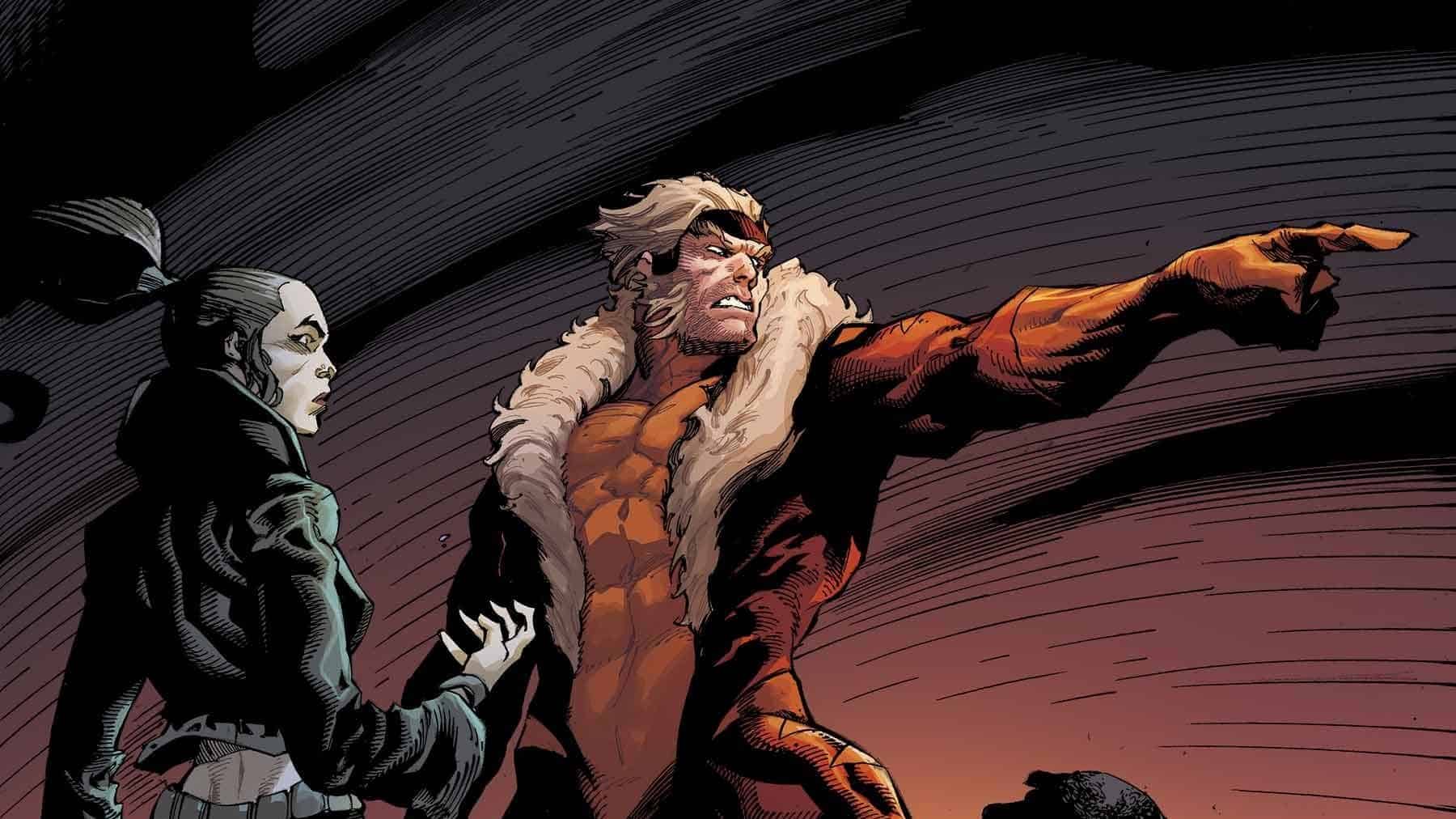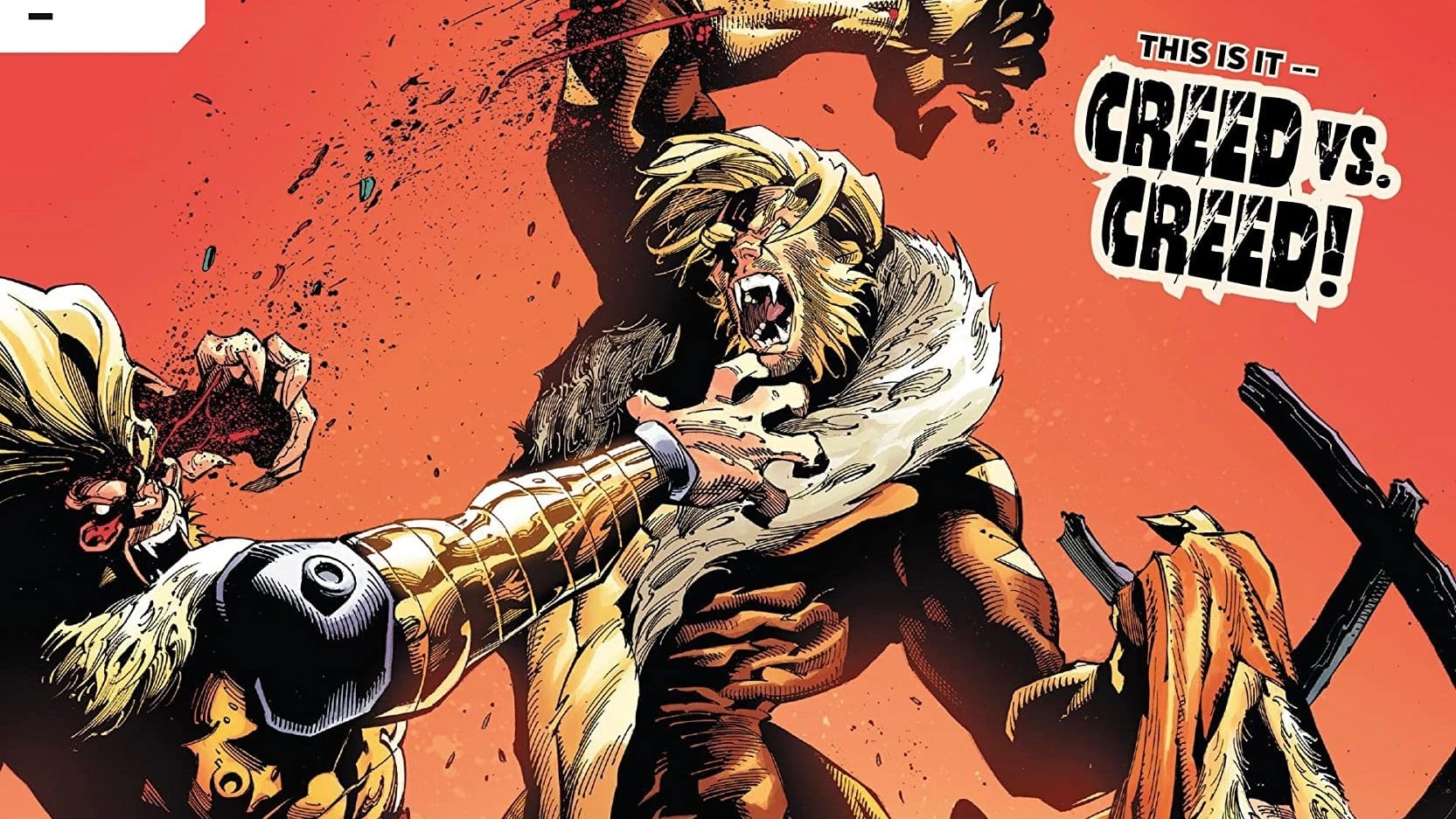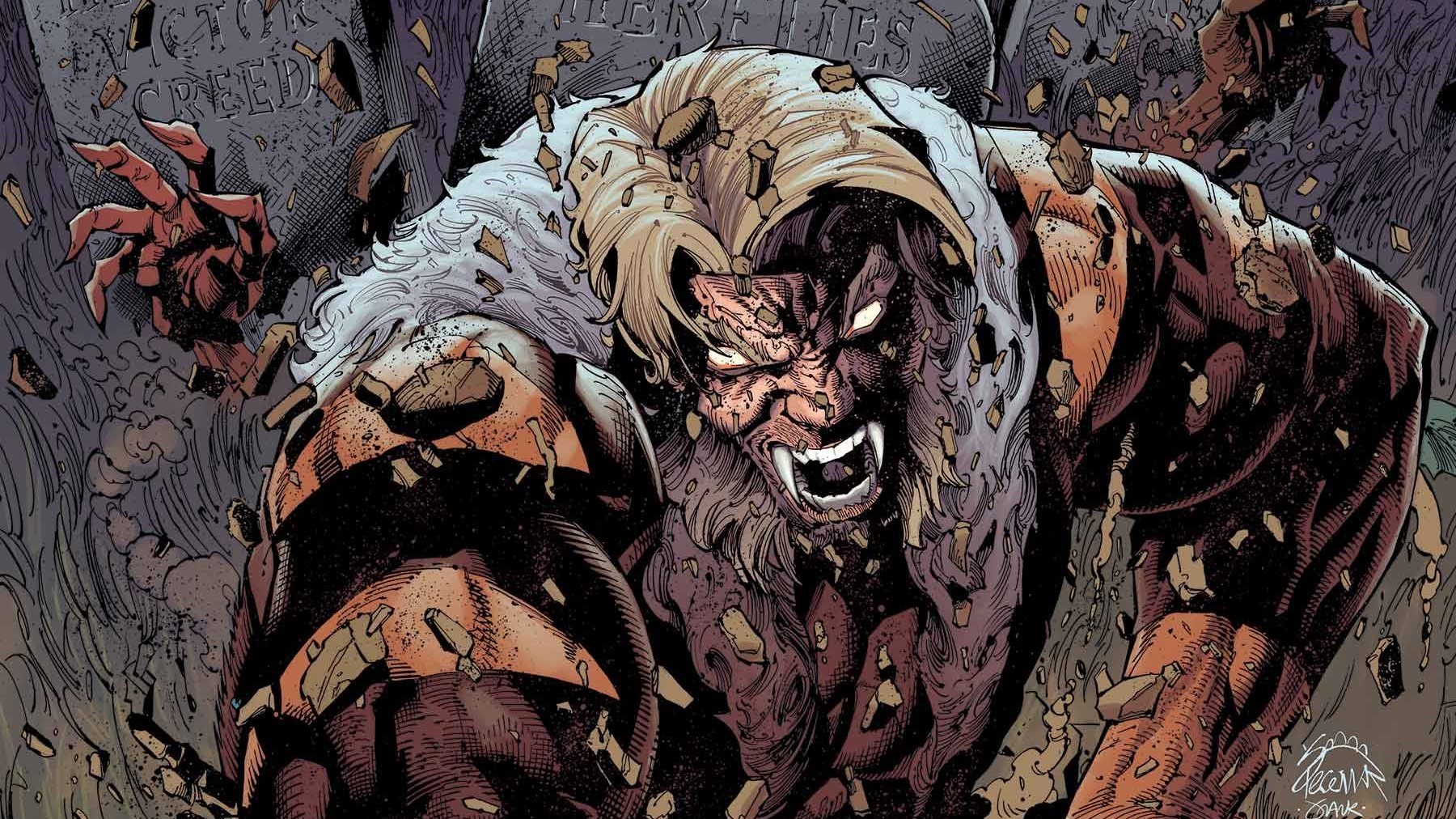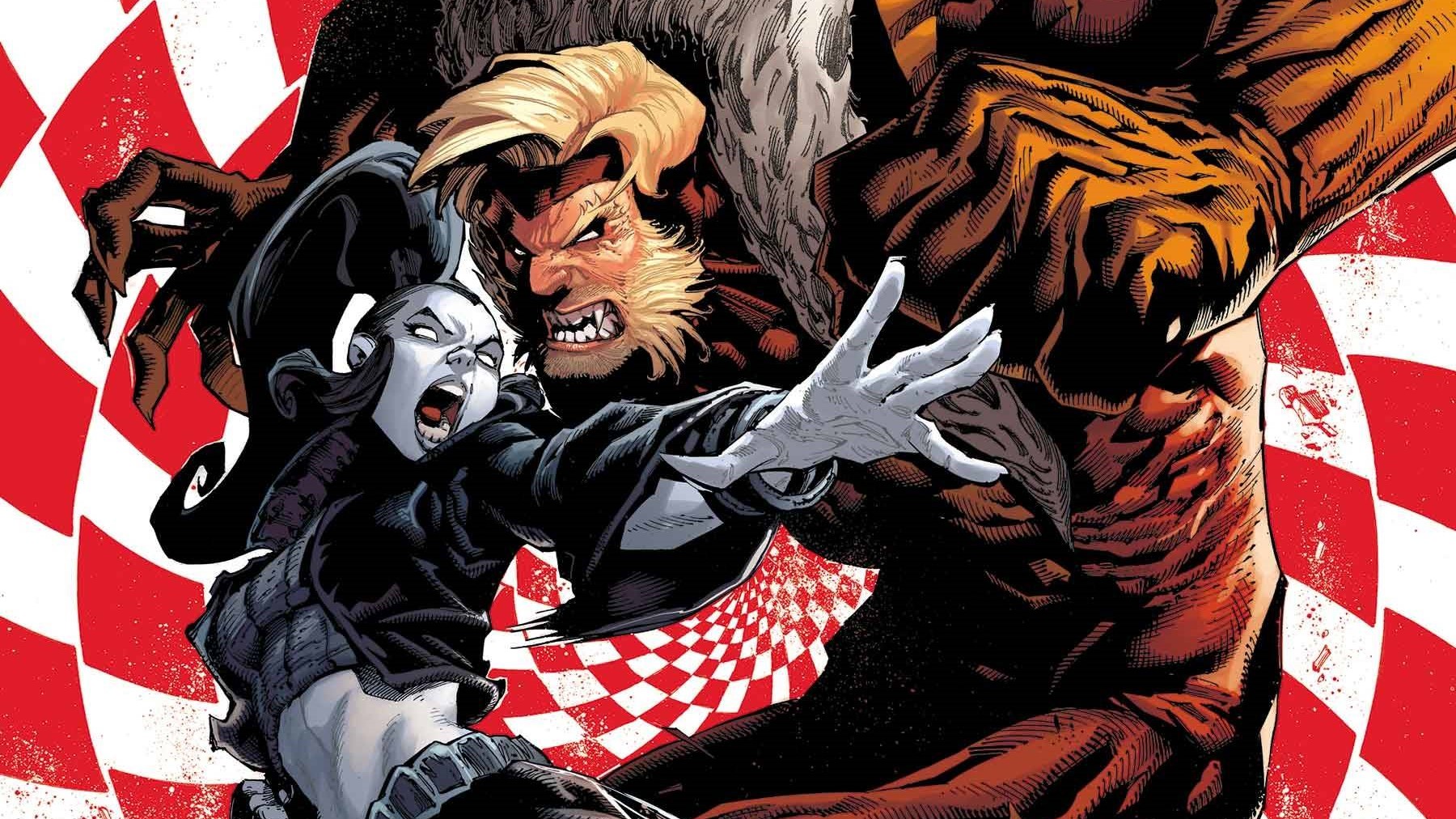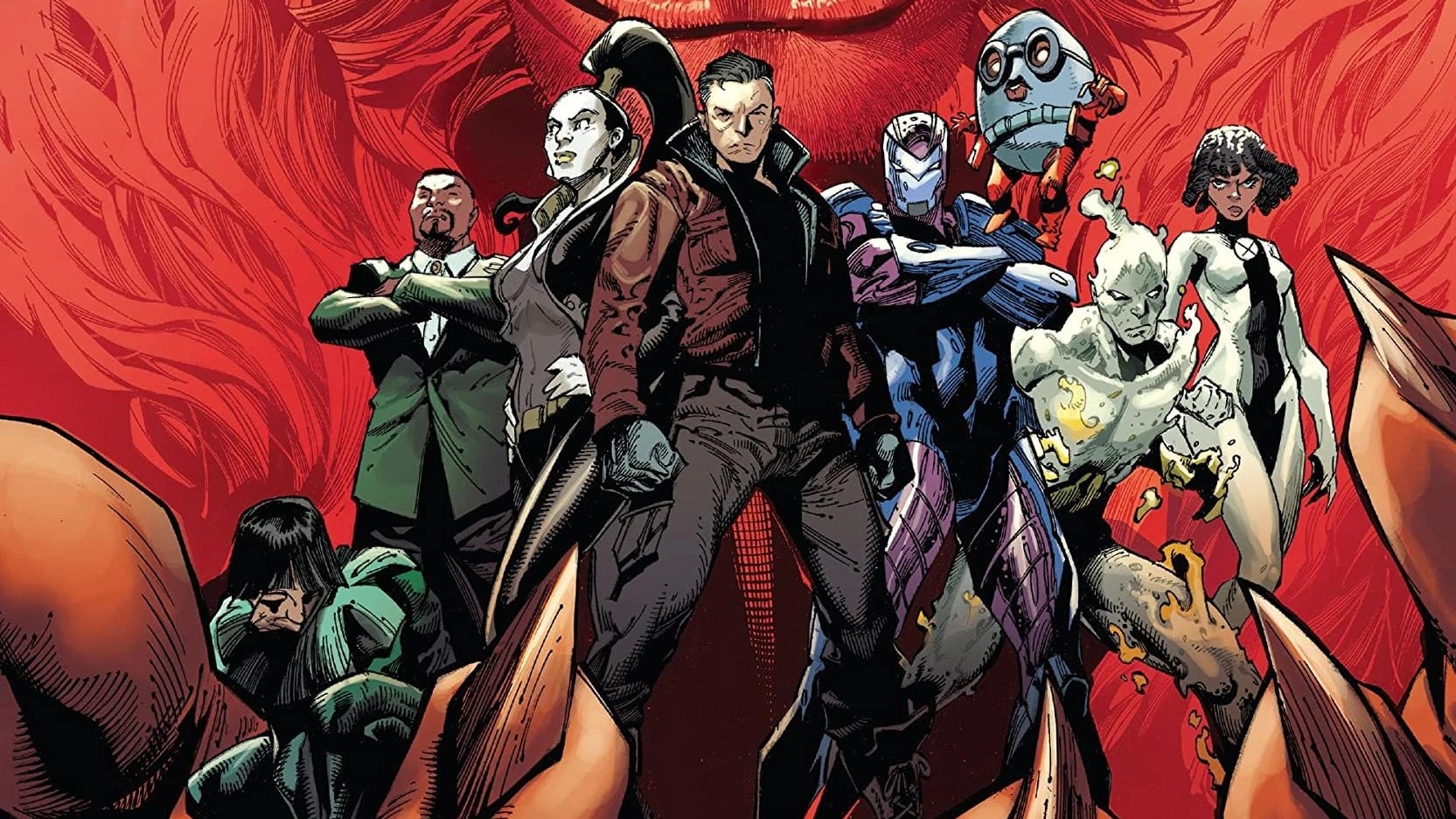Will Victor Creed survive getting saved by the Exiles? It’s tough to lead when your team hates you, and even harder when your powers are on the fritz, courtesy of a new invention that threatens the survival of all mutantkind! Come for the mutiny, stay for the medical malpractice in Sabretooth and the Exiles #2, written by Victor LaValle, drawn by Leonard Kirk, colored by Rain Beredo, and lettered by Cory Petit.
Jude Jones: From the first word of the first panel on the first page, everything you need to know is laid out clearly, concisely, competently.
Toad notes that there’s a team that’s not a team; Nanny notes time is of the essence. Oya, spirit still somehow unsullied, can’t watch the brutality; Melter, changed irrevocably from his time in the pit, embraces it. Third Eye, head down, frustrated, sarcastically scolds their circumstances; Jeffries, head high, still looking away, concurs.
Nekra, beating Sabretooth’s ass, gives image to the character’s contemplations. Sabretooth, reeling…just reels.
In a classic, expertly executed nine-panel page, two prongs of the plot come into focus: First, Sabretooth is severely weakened; second Nekra, very much aware she has something that could – should! – punish Sabretooth, declines to use it. Ostensibly, it’s because she’s done taking orders from Krakoa on faith, a faith that’s been irrevocably damaged.
And yet, she holds onto the seed instead of destroying it.
Comic characters come with decades of experiences baked in. This can sometimes make reading a comic feel laborious, necessitating researching names, places, and whole arcs to get an understanding of the dynamics on page. LaValle, in three pages, provides context on these characters and their situation so well that one could get away with not reading the first issue of the run and still feel engaged.
Note I said “could” and not “should.” Sabretooth and the Exiles #2 furthers this run’s reputation as one of, if not the best book Marvel Comics produces. Full stop. Thoughtfulness, Timeliness. Humor. Violence bridled by necessity and a conscience. This issue is a continuation of the good work, and I, again, and forever grateful we get to read it.
Anna Peppard: We’ve known these versions of these Exiles for such a short time, but they already feel so familiar. So much so that my reaction to the opening sequence introducing everyone through their respective participation and reaction to violence was like–yes, this makes sense, everyone is perfectly in-character, both narratively and visually. And I’m so happy to see and yell about these characters again, especially Nekra, whose long and painful route to becoming awesome continues to make her awesomeness that much awesomer. We also get another chance to talk about the racist and ableist history of reproductive rights! This book continues to spoil me rotten.
Jude: A lot happens between these pages, but the bulk of the action involves Sabretooth’s decay, Dr. Barrington’s (lack of) ethics, and the collateral damage borne by the innocents.
Sabretooth and the Terrible, Horrible, No Good, Very Bad Day.

Jude: I often tell people that I don’t believe in good or bad people, just good and bad actions that all people, no matter how we view them, are capable of committing. Kind people can kill; cruel people can be kind. That said, I think most would agree Sabretooth, the maniacal, subversive killer, would qualify as evil. I probably wouldn’t spend much time arguing about this.
So, then: do evil people deserve empathy?
The Sabretooth we see here is weakened and withering because of a power-dampening coil placed in his stomach. His healing factor is slowly giving out on him, preventing him not just from beating Nekra, but from healing from the beating she gave him. He can barely stand, and though he thinks he can hide behind his normal swagger, it’s clear: he’s hurting.
What’s not clear, however, is if we should care. He’s proven to be an impediment to the team (to the degree the Exiles can be called a team). He’s sold out countless people, including he captured mutants who recoil at his appearance.
He is, to put it mildly, strongly hated.
And yet: Nekra declines to “punish” him with Doug and Krakoa’s seed. She, assuming leadership (note the pose!), gives reason for keeping him alive and on the team. She shows Sabretooth an incredible amount of grace – after beating his ass, of course. Maybe she sees part of her in him: a “villain” whose done villainous, murderous things. What, I imagine her thinking, separates him from me? If he is punished, should I not be?
Of course, the fact that she has a conscience (voiced for the audience by Oya) separates her from him. Still, it’s noteworthy that he who shows no kindness is only alive due to the kindness of the least kind member of the team.
It’s like an inception of irony. Cue the music.
Anna: Gosh, do I ever love Nekra doing her leadership thing here. Because it centers her and keeps giving her more and more of that complexity she’s been cruelly denied for most of her comics history, but also because of the type of leader she is. Her anger is tempered by deep empathy, the source of which I haven’t completely figured out yet in relation to her hate-based powers, but it feels right. Her powers are rooted in emotion; makes sense she’d be emotionally intelligent.
That emotional intelligence comes across through all of Nekra’s interactions with Oya, her perceptiveness regarding Sabretooth’s emotional and physical condition, and through an interaction with Madison Jeffries. Sabretooth wants Jeffries to tell the station computers what to do. Jeffries says he could, but won’t–he’s willing to ask machines to do stuff, but won’t force them. Nekra puts a hand on Jeffires’ shoulder and tells him to ask. Are Nekra’s motives totally altruistic? Maybe yes, maybe no. But she’s smart enough to trust her team’s strengths, and the contrast between that approach to leadership and Sabretooth’s individualistic fury is both interesting and gracefully handled.
Dr. Barrington, the (Un)Necessary Evil

Jude: Barrington, like Sabretooth, radiates evil. Yet where Sabretooth is passionate, sarcastic, and conniving, she is cold, clinical and shockingly forthright in her depravity. In her brazenly racist note to Orchis, she compares her experimentation on mutants to the experimentation done on Puerto Rican women to create the birth control pill, presenting them as equally positive. Her “moral” center only exists to further her desires, damn the cost, damn the collateral damage.
Anna: While I’m beyond thrilled that this book continues to educate while it entertains, I have to confess, Barrington’s letter to Orchis comparing a real-life medical technology–birth control pills–to an imaginary one–the “Barrington Coil,” a device supposedly capable of suppressing mutations–made me just a little bit edgy. In Barrington’s comparison, birth control pills are equated with population control and even genocide. To be fair, contraceptives and sterilization have historically been forced on certain people, usually for classist, ableist, and/or racist reasons, and, in a different but related vein, some anti-choice folks consider birth control a form of genocide. Plus, Barrington is our villain; she thinks genocide is a good thing and it is extremely clear the comic is not on her side. But it’s still a case where I can’t quite decide whether comparing a specific real thing to a broader fictional thing does more to illuminate or obfuscate–whether the real history of reproductive rights is being appropriated to tell a story about mutants or whether mutants are being used to tell a story about reproductive rights.
It might work better for me if the Barrington Coil was more specifically linked to reproduction, a possibility that seemed close at hand, since the name and look of the thing made me think of an IUD, sometimes called an “intrauterine coil.” IUDs are, of course, another contraceptive technology that’s both really useful and very imperfect, both historically and in the present. They definitely work and some people have great experiences! But I found myself shuddering in empathy with Sabretooth’s pain, recalling my own less-than-ideal IUD experiences, including a painful insertion conducted without painkillers because the doctor told me I “looked tough enough to handle it,” and the fact the device made me bleed so much I developed severe anemia. But I’m bringing this context to the comic; we’re not specifically given these types of details, and that’s what troubles me. To me, it feels like gesturing toward something important but brushing past it. Yet I fully concede my interpretation is highly subjective, and I remain grateful for LaValle’s hits of history.
What I did love with Barrington in this issue was the presentation of her not as a salaried employee of Orchis, but rather a mistreated independent contractor, desperate to prove her worth. I won’t say this made me sympathize with her; she is the actual worst. But it did hammer home the fact that evil isn’t just about individuals; it’s about systems, in this case, the evil system of capitalism.
Jude: Barrington’s capitalistic evil, then, is the more familiar, and thus more insidious kind. She is brazen, yes, but she is not novel. She simply follows the genocidal footsteps of her forefathers, rightly believing racism will endear her to her betters. LaValle’s made it a point to eliminate any pretext of hiding allegories. I find this refreshing and necessary. Remember, the evil in the world we live in is not hiding; remember that to talk plainly about the evil in the world is quickly becoming politically unpalatable, if not outright illegal. Remember that the evil in the world that we thought we stomped out is increasingly omnipresent. Thus if evil is not hiding, maybe it’s not worth the effort to hide the allegories. Maybe some people need to see it plain.
Western culture often depicts devils as ugly, horrific creatures. Think of, oh I don’t know, Sabretooth. That her evil is kind, personable, and conventionally attractive is disarming – and makes her and her ilk even more dangerous.
Barrington charming the mask off Orphan Maker is a perfect encapsulation of this. She exploits a weakness – a desire to be his own man, in Orphan Maker’s case – and she charms him into doing her bidding.
Also, note that her Creation (literally named The Creation) is a blonde woman, just like her. She made evil in her own image. How very human of her, indeed.
The Cries of the Innocent

Jude: Routine was as tiring as it was predicable. The police would signal me over. They would look at my license and run my plates. My heart would beat out of my chest. “Is this the day…” I would think to myself, unable and unwilling to complete the sentence, for fear the completion of the thought might be a summoning spell, resulting in my imprisonment or impalement.
Or worse.
But, luckily, nothing happened. (Yet.) They would let me go, often without giving reason for the stop.I appreciated the lack of a reason. The indignity didn’t need to be furthered with a lie.
All of the mutants captured by Orchis have a certain look. All of them – green and red, beaks and tentacles – don’t look like, say, Hope or Jean. These people’s only offense was their look – a look that wasn’t convenient. Note how the only two “normal” looking mutants are Black and Brown.
I wonder if Orchis furthered their indignity with a reason before their capture? Again, I wonder what reason the X-Men will have for their absence?
Anna: The fact no one else from Krakoa is trying to rescue these mutants hits hard. Granted, it’s entirely possible no one knows that they’re missing. But that’s part of the problem, isn’t it? No one knows they’re missing, either because no one noticed or no one cares.
Jude: And of Orphan Maker: an experiment by Sinister gone awry (how many stories have started that way?), saved by Nanny whose soft spot for children might be her redeeming characteristic (if, you know, she too wasn’t sadistic). He’s had so little autonomy. It’s sad that his only moments of autonomy in the Krakoan era resulted in him hurting people (remember the two “innocent” humans he murdered in the Hellions, which put him in the Pit). Here’s a man in obvious mental distress, never given the proper support, support that would have prevented a murdered and now maybe apocalypse.
Would his condition have been better taken care of if he looked like Franklin Richards or Katherine Pride?
The innocent suffer because we don’t value how they look; and when we allow them to suffer, we ultimately set up the scenario for our own destruction.
Anna: The X-Men getting burned for neglecting the mental health of a teammate who badly needed help and didn’t get it? Where have I heard that one before… or right, in every X-Men story ever! I’m exaggerating for comedy value, but still–this does happen a lot, the Dark Phoenix Saga being among the most famous examples. But while it engages with tropes, the story at hand isn’t derivative, because the finer points of the thing are specific to the specifically twisted yet creepily mundane relationship between Nanny and Orphan-Maker. I’m sorta-kinda rooting for Orphan-Maker’s terrible power being a fakeout–a lie Nanny tells to control him and compel others to let her control him. But no bets either way.
Jude: The issue ends with Third Eye bringing everyone to the Astral Plane to see if they can reset Orphan Maker’s mutation. Everyone apparently includes “The Creation” who tried to kill them all last issue. Again, note how these Exiles (save Sabretooth) operate with a gentleness many traditional heroes rarely show.
How did they say in the beginning of the first issue?
Justice? Just us? Just Us.
X-Traneous Thoughts:
- The creation and Sabretooth have the same eyes.
- I’m still assuming the GC is Greydon Creed. I could be wrong.
- (I’m not wrong.)
- Rain Beredo’s coloring here is great, specifically his skin coloring. Oya and Third Eye’s tones look natural; a darker skinned person exists. Given how, over the course of the past year, I’ve seen Luke Cage and Storm colored light pink, his tone-accurate representations deserve heaping amounts of praise.
This review will be published on the 12th anniversary of my mother’s death. She was – is – a good woman who gave much of her life so I could pursue my dreams – even if those dreams included writing about comics. If you’re so inclined, feel free to donate to the causes she helddear. Or donate to a cause you or your loved ones hold dear. Or just hug someone you love. All acts of love are equally accepted.

